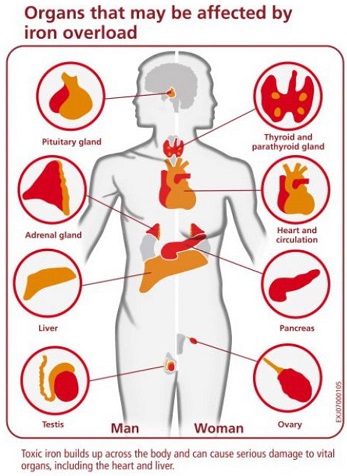Iron is an essential mineral in our bodies because (source1; source2):
- Without a sufficient amount of iron, your body can’t produce enough hemoglobin, a substance in red blood cells that makes it possible to carry oxygen to the body’s tissues.
- Iron is used by the body to help regulate cell growth and cell differentiation.
- Iron also helps keep your hair, skin and nails healthy.
- Iron is also found in myoglobin, a protein that helps carry oxygen to the muscles and in some enzymes that help in biochemical reactions.
Free iron is toxic to cells. Hence, humans and other vertebrates have an elaborate set of protective mechanisms to bind iron in various tissue compartments.
In vertebrates, iron is stored in an intracellular protein as ferritin — usually found within cells, although it is also present in smaller quantities in (blood) plasma. Plasma ferritin is an indirect marker of the total amount of iron stored in your body.
The normal range of ferritin is 22 to 291 ng/mL (nanograms per milliliter).
An iron deficiency can reduce oxygen delivery to the cells, leaving a person fatigued and with a compromised immune system.
Anemia is a health condition that develops when your blood has a deficiency of red blood cells or of hemoglobin in the blood. Hemoglobin makes up two-thirds of the body’s iron levels.
Symptoms of anemia include:
- Fatigue or tiredness
- Dizziness
- Shortness of breath
- Cold hands and feet
- Headaches
- Rapid heart beat
Iron supplements are over the counter, but it can be very unhealthy and dangerous to take too much iron because the body cannot easily get rid of iron and will start depositing the excess iron in the heart, pancreas and liver. This can cause liver cancer, cirrhosis, diabetes and cardiac arrhythmias. The only way to shed excess iron in your body is by donating blood. (NYT)

In fact, a massive study published in 2020 found a link between blood iron (ferritin) levels and lifespan.
David Nield reports for Science Alert that a study of genetic information from over 1 million people across three public databases found that having too much iron in the blood is linked to an increased risk of dying earlier. The study was published in July 2020, in the journal Nature Communications.
Paul Timmers, a data analyst from the University of Edinburgh in the UK, said: “We are very excited by these findings as they strongly suggest that high levels of iron in the blood reduces our healthy years of life, and keeping these levels in check could prevent age-related damage. We speculate that our findings on iron metabolism might also start to explain why very high levels of iron-rich red meat in the diet has been linked to age-related conditions such as heart disease,” Parkinson’s and liver disease.
While correlation doesn’t necessarily mean causation, the researchers used a statistical technique called Mendelian randomization to reduce bias and attempt to infer causation in the data.
We can add this latest study to the growing evidence that “iron overload” can have an influence on how long we’re likely to live, as well as how healthy we’re likely to be in our later years.
~E
